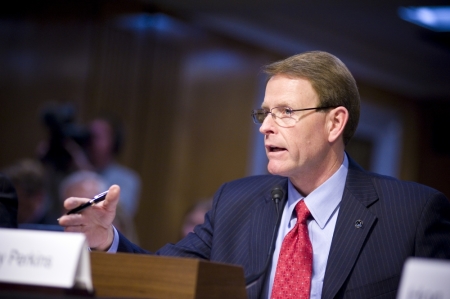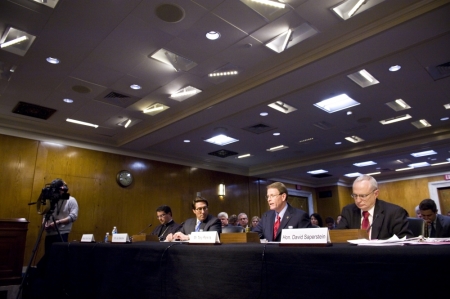Does Obama's 'Freedom of Worship' Hurt International Religious Freedoms?

Sen. James Lankford, R-Okla., and Family Research Council president Tony Perkins argued that limiting religious freedom to "freedom of worship" in the United States has hurt efforts to advocate for religious freedom abroad.
"I think the lack of priority on religious freedom that we have placed here domestically on our policies does send a message internationally. I think there is a correlation between the growing intolerance of religious freedom, not freedom of worship, but the growing intolerance toward religious freedom, like in the marketplace, is giving rise to persecution abroad," Perkins asserted before the U.S. Senate's State, Foreign Operations Subcommittee hearing on protecting international religious freedom Wednesday. "We no longer make it a priority here domestically, that sends a message to bad actors abroad that 'America no longer puts a high priority on religious freedoms so we don't have to worry about them moving against us based on that.'
Perkins noted how the Obamacare HHS mandate on birth control health care coverage has forced private businesses, like Hobby Lobby, to go to court to fight for their religious freedom.
In a Thursday interview with The Christian Post, Perkins clarified that there is a clear distinction between the penalizing of Christian business owners in America who stick up for their beliefs and the Christians killed and imprisoned in other parts of the world for their faith. However, there is still a responsibility for American Christians to stand up for their religious rights.
"But as Christians here in this country, if we refrain from speaking out and exercising our freedoms, we put the lives of Christians elsewhere at risk if we allow our religious freedoms here at home to be lost," Perkins added.
Lankford, who is the co-chair of the Congressional Prayer Caucus and presided in the hearing, agreed with Perkins that the current limitations on religious liberty domestically can have an impact internationally, and added that the United States is responsible for setting a positive precedent.
"I made a comment in my conversation with the panelists that the United States has a responsibility to be a beacon of light for religious liberty and free speech and tolerance of individuals," Lankford told CP. "When we set that example, we can multiply, we are on a good platform to do that. When we begin to limit free speech and freedom of religion in the United States, it diminishes our opportunity to be able to do that worldwide."
"So, when universities want to be able to limit what Christian organizations can do on a campus, when Navy chaplains are limited on what they can say and do in regards to Scripture, when individuals can't fully live out their faith in the workplace, those become serious issues because it diminishes the rights that we want to encourage worldwide within our own country," Lankford continued.
Since President Barack Obama took office, the notion of "freedom of worship," as opposed to "freedom of religion," has become a contentious issue. The religious exemption in the birth control mandate, for instance, applied to houses of worship but most religious non-profits were not exempt.
Lankford asked the panelists to explain the difference between freedom of worship and freedom of religion and what philosophy they think America should prescribe to.
Jay Sekulow, chief counsel for the American Center for Law and Justice, said in his testimony that the freedom of religion is an internationally-held benchmark stated in the Universal Declaration of Human Rights signed in 1948.

"I think the best thing to do is look at the Universal Declaration of Human Rights, article 18 which states that 'everyone has the right to freedom of thought, conscience and religion.' That would assume both freedom of religion and freedom of worship," Sekulow said. "I would also add that in addition to our view of in the United States of religious freedom that it assumes also religious worship. The European Court of Human Rights, where I have litigated cases and we have litigated cases, they recognize that religious freedom and worship go together."
State Department Ambassador-at-Large for International Religious Freedom, Rabbi David Saperstein, who was appointed by Obama in 2009 and also testified at Wednesday's hearing, stressed the importance of advocating for freedom of religion.
"Freedom of religion is absolutely essential. Freedom of worship is absolutely essential but it doesn't cover the freedom to educate your children, freedom to speak out on your religious beliefs, to proselytize others, freedom to get together in group activities beyond worship. It doesn't include the right of people to choose the faith that they want or choose not to believe. All of those are covered under international accords by freedom of religion," Saperstein explained. "It's very important and I was delighted that the Secretary of State, at my swearing in, used freedom of religion, hear the president has used 'freedom of religion.' It is important that be the message going out to the world."
Despite Saperstein's remarks, Perkins is not sold that the Obama administration will act according to Saperstein's desires.
"It is encouraging to hear [Saperstein] talk about the freedom of religion as opposed to the freedom of worship. But the jury is out, we have seen in this administration that even some people with the best intentions are kind of handcuffed by the views of this administration," Perkins told CP. "Based upon his statements and his testimony, he understands the importance of religious freedom."
Lankford additionally told CP that he would like to see the Obama administration to a better job holding countries that receive U.S. aid like Pakistan and Saudi Arabia more accountable for protecting the religious liberties of religious minorities.
Lankford said this can be accomplished through visa bans, a "countries of particular concern" designation and requiring U.S.-aided countries to provide religious freedoms to all their citizens.
"Those are basic requests that we want to be able to engage with your country, we think it helps the American security and helps with human dignity worldwide, but we would have a request. It is the 'if, then' on any kind of funding," Lankford explained. "Same as we do with Egypt, same as we do with multiple areas around the world with many issues of the way we handle foreign aid, we have requirements to how we handle foreign aid …. We have to say 'if you are going to be involved with the United States of America, we want to know that your country is open to all people within your country are respected regardless of their faith.'





















